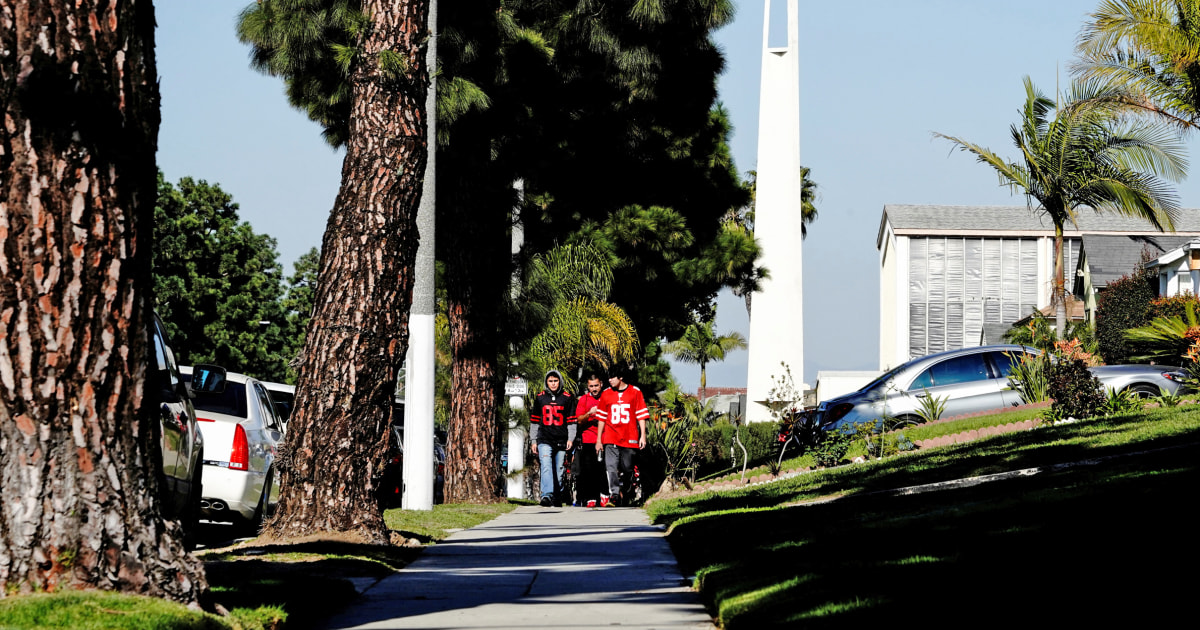
INGLEWOOD, Calif. — Los Angeles middle school teacher Shirley Sher had grown tired of commuting an hour or more each way from the San Fernando Valley to the beach cities just to drop off her children at school.
She missed the breezy weather and the cultural diversity of Westchester, a bustling yet manageable neighborhood near Los Angeles International Airport.
But home prices in Los Angeles were already skyrocketing when she was house hunting in 2019, and buying a house near the coast seemed out of the question. Then she found Inglewood, the host of Sunday’s Super Bowl.
“It has so much to offer,” Sher said, adding that while her neighborhood is mostly Latino, diversity abounds. Her immediate neighbors are Black, white and Greek. “It has hidden pockets,” she said.
Inglewood has always been a city in transition.
What started as a sleepy agricultural hub in the 1880s transformed into the so-called City of Champions in 1932 after an Olympics marathon race snaked through the area. Two local athletes took home medals that year in track and the pole vault, according to records from the International Olympic Committee.
It later became a white, middle-class city before Black residents became the majority in the 1970s and the ’80s, and it is now majority Latino. Combined, more than 90 percent of Inglewood is Black or Latino.
For many years, Inglewood was considered a quiet city with only the 1980s- and ’90s-era Great Western Forum — the former home of the Los Angeles Lakers basketball team and the Los Angeles Kings hockey franchise — and a few department stores to bring in business.
That started to change when the Los Angeles Rams and the Los Angeles Chargers set up shop in this midsize city about 11 miles southwest of downtown Los Angeles, quietly moving the housing goal posts higher and higher.
“There’s this reputation based on popular culture or hearsay, usually about Inglewood being a bad neighborhood — being ‘up to no good’ and that stuff,” Inglewood resident Christopher Smith said.
“It’s an ethnically diverse, working-class city, and that makes some people uncomfortable,” he added. “I see it as a benefit.”
The city, which will host the Super Bowl for the first time Sunday, is the latest urban community to confront challenges as home prices soar and gentrification moves in.
Through the first 11 months of 2021, the median price of the 595 home sales in Inglewood was $719,680. Both the total sales and the median price were major boosts going back to 2015, according to housing data gathered by the financial services company CoreLogic.
Home prices have been on a steady climb for years.
- In 2015, the year before workers broke ground on SoFi Stadium, 547 homes sold in Inglewood at a median price of $382,395.
- Shovels hit the ground Nov. 17, 2016, the same year 506 homes were sold in Inglewood at a median cost of $436,192.
- In 2017, 2018 and 2019, there were 583, 577, and 474 home sales respectively, at median prices of $489,431, $570,248 and $583,847.
- The first football games were played at SoFi Stadium in 2020, when 485 homes were sold at a median price of $667,841.
The median price surge in Inglewood from $382,395 to $719,680 is a stunning 88 percent spike. In the same span for Los Angeles County, minus Inglewood, the cost of a home purchase jumped from $663,914 to $990,461, a 49 percent bump that pales in comparison to the rise in the City of Champions.
The city’s central Southern California geography and healthy stock of single-family homes, many in classic Spanish revival architecture, should have always made Inglewood a prime spot for real estate speculation, said Selma Hepp, CoreLogic’s deputy chief economist.
But the tipping point finally came a decade ago when $500,000 became a nonstarter for prospective Los Angeles County homebuyers, and marginalized Southern California residents, like immigrants and the LGBTQ community, seized on the opportunity in Inglewood.
“It’s been the right place at the right time,” Hepp said.
In many ways, Inglewood represents the classic Southern California neighborhood. Towering palm trees dot the landscape around restaurants, schools, parks and single-family homes. Places of worship offer services in English and Spanish.
Today’s main attraction, the vast, arrowhead-shaped SoFi Stadium, emerges like a silver beacon, dwarfing the neighboring Great Western Forum.
It cost $5 billion and is considered the most expensive stadium in the U.S.
“Before, our brand was crime, gangs and poverty,” said Inglewood Mayor James T. Butts, who pushed to secure the SoFi Stadium deal and has prioritized redevelopment since taking office in 2011. “Now there is a sense of civic pride I hadn’t seen.”
In addition to this weekend’s Super Bowl, it will also host the college football national championship game in 2023 and serve as a backdrop for the opening and closing ceremonies of the 2028 Summer Olympic Games.
In 2024, the Los Angeles Clippers will move into their new home at the yet-to-be completed Intuit Dome across the street to the south of SoFi Stadium.
“I knew that we were going to be forever changed,” Butts said at the opening of SoFi Stadium in 2020. “And that was a tipping point.”
The stadium has already found itself at the center of controversy after a San Francisco 49ers fan was severely beaten following a game at the stadium. The victim remains in a coma.
SoFi Stadium has also drawn criticism from some residents, who say its debut helped usher in a new era of gentrification and rising home prices in a city where the median annual household income is $54,400 and just 36 percent of residents own their own homes, according to the most recent census data.
Last month, cleanup crews from the state Transportation Department cleared encampments belonging to unhoused residents near the stadium.
Some residents and activists bristled at the timing, accusing city leaders of attempting to scrub anything negative from Inglewood ahead of the Super Bowl.
“They really don’t care about the homeless’ needs, I feel,” Inglewood resident Nicole Randolph told NBC Los Angeles. “It’s more about the money, the football.”
Butts said “there is absolutely no connection to the Super Bowl,” adding that the cleanups happen periodically under the direction of the transportation department and do not reflect the city’s attitude towards its unhoused residents.
Alicia Victoria Lozano reported from Inglewood and David K. Li from New York City.
Source: | This article originally belongs to Nbcnews.com










